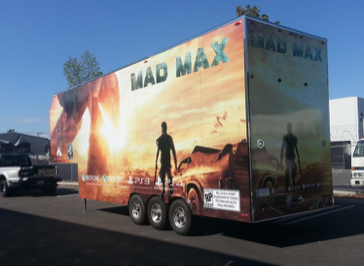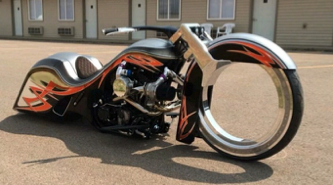What type of wrap works best for your vehicle?
Vehicle wrapping is a great way to advertise a business, get your name out on the road or simply give a unique, customized, and fun look to a vehicle.
However, not every vehicle should be treated the same way. Wrapping a truck is different from a boat and an RV different from a motorcycle. A number of things go into choosing the right type of vehicle wrap for the job. Before you jump in and have your car, truck, boat, RV or any other vehicle wrapped, think about each of the following and make sure your wrap will stand up to the elements! |
 |
- Water – While nearly every vehicle may face water at some time or another, there are certain vehicles that face it more often than others. Will your car or truck be parked in a garage? Are you thinking about wrapping a boat? These are all important considerations for the type of material.
- Salt – You may think of salt only as far as boats and other watercrafts. However, any vehicle that spends time on the roads in winter may face salt residue. Additionally, road vehicles stored near the beach will have some salt impact. This can cause the wrapping material to degrade faster than normal and will require extra care.
- Sun – The more a vehicle is in the sun, the more important it is to choose a wrap that is designed to be fade resistant. Without this, the wrap will look old and dated very quickly. If you’re choosing a digitally printed wrap it is important to select a UV resistant overlaminate.
- Dirt – Nearly every wrap is designed to handle a bit of dirt. However, if you are driving in a very dirty environment, it may pay to choose a more durable, heavy-duty wrap for long term benefit. Also, be sure to follow the manufacturers recommended cleaning techniques to ensure the longevity of the wrap.
- Chemicals – Chemical usage is a very important consideration. What chemicals will be used to clean the wrap? Is this something that can be adjusted? Choosing the right cleaning supplies for your wrap will lead to a longer lasting wrap.
- Shape – The shape of the vehicle helps determine which wrap will work best. Wrap films are classified in two categories, cast and calendered. The cast films are highly conformable and wrap around complex curves, whereas calendered films are designed for simple curves or flat surfaces.
- Condition of the paint – The condition of your vehicle’s paint job is critical to the look and performance of your wrap. Most manufacturers only warrant wraps on factory OEM paint jobs. It is not recommended to apply a wrap to a car with excessive flaking, chipped or faded paint jobs.
A motorcycle, for example, is a smaller “canvas” but has complex curves so it is important that you choose something that is conformable (a cast film). While most motorcycles are well protected from water (except the occasional rainstorm that occurs while you’re out riding), motorcycles DO get dirty and will be exposed to cleaners and other chemicals. As such, it is important to pick a wrap that can handle these things. A boat is completely different — it will be constantly wet and faced with sun and salt. Because of this, a wrap for a boat should be completely different from one for a motorcycle.
 |
Whether you're wrapping for fun or as a way to advertise your business, before you get started, take the time to talk to an expert about the available options and your unique needs. The time you put in before wrapping can make a big difference in the life and looks of your wrapped vehicle. |
